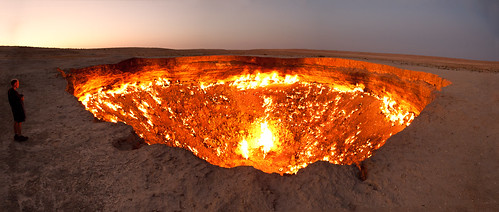A few months ago I had made a post about a "Lake on Fire". I now present an oil gas crater on fire - aptly called "Door to Hell" because it is located near a small town of Darvaza in Turkmenistan. "Darvaza" in Persian Means "Door".
It is understood that while drilling in 1971, the Soviet geologists accidentally found an underground cavern filled with natural gas. The ground beneath the drilling rig collapsed, leaving a large hole with a diameter of about 69 meters and a depth of about 30 metres. To avoid poisonous gas discharge, it was decided to burn the gas. At that time it was thought that the gas will be burned away in few weeks, however it is still burning with no sign of abatement. It has now become a tourist attraction.

It is understood that while drilling in 1971, the Soviet geologists accidentally found an underground cavern filled with natural gas. The ground beneath the drilling rig collapsed, leaving a large hole with a diameter of about 69 meters and a depth of about 30 metres. To avoid poisonous gas discharge, it was decided to burn the gas. At that time it was thought that the gas will be burned away in few weeks, however it is still burning with no sign of abatement. It has now become a tourist attraction.

Image from Flickr is by Tormod Sandtorv
Image from Panoramio is by lorenzo faneschi
View location in Google Earth Google Maps
Source of information: Wikipedia

Pintu Neraka .... Ya Allah selamatkan kami dari Neraka-Mu.
ReplyDeleteThat is absolutely amazing! It is sad to think of all the money wasted on that burning hole.
ReplyDeleteHi Anonymous - I think cost of capping the well may be exorbitantly high for a well of this size. Moreover as per Wikipedia;
ReplyDelete"To avoid poisonous gas discharge, it was decided to burn the gas. Geologists had hoped the fire would go out in a few days but it has been burning ever since.....
Next to capturing the gas, flaring is safer and friendlier to the environment than releasing the methane into the atmosphere as methane is a relatively potent greenhouse gas with a high global warming potential ...